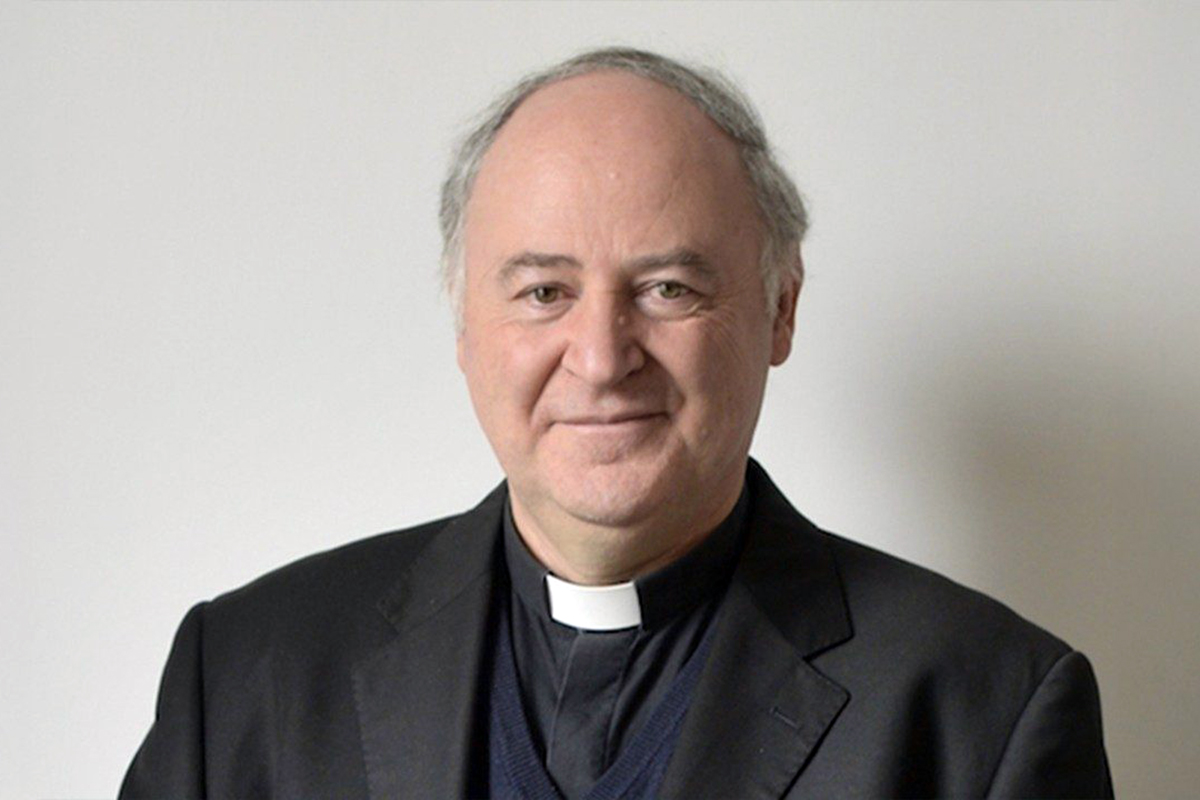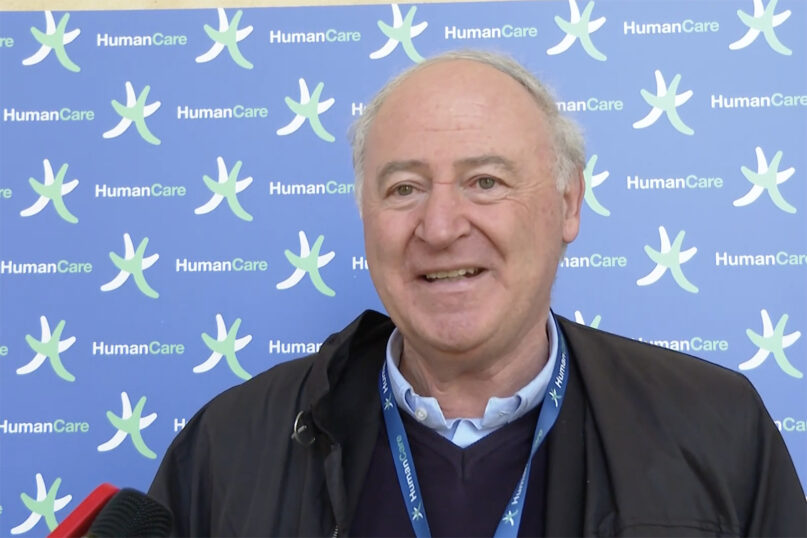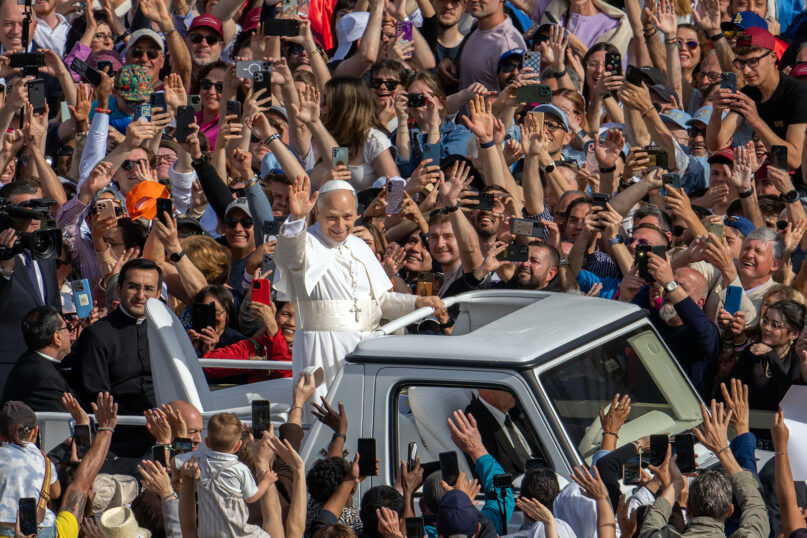
VATICAN CITY (RNS) — Pope Leo XIV has appointed a new president for the Vatican’s Pontifical Academy for Life, a bioethics think tank that Catholic conservatives criticized under Pope Francis for departing from official church teaching on issues such as contraception and euthanasia.
The pope tapped Monsignor Renzo Pegoraro, chancellor of the academy, to take over the role from Archbishop Vincenzo Paglia, who at 80 had surpassed the retirement age of 75 for Vatican officials. Paglia’s tenure was marked by a shift in the institution’s focus from abortion and other issues it deems “pro-life” to broader challenges facing the church, including artificial intelligence and biotechnologies.
Pegoraro, 65, was born in Padua and had a background in medicine and bioethics before he was appointed chancellor to the Academy for Life in 2011 by Pope Benedict XVI, a position Pegoraro continued under Francis.
Pegoraro told RNS he is prepared for the “new and challenging” role and plans to continue the broader focus and “the work we have already done and at the service of the entire church,” including end-of-life issues, genetic engineering and AI.
Leo’s papacy comes at a time of rapid advancement in the field of bioethics, with genetic engineering and AI challenging what it means to be human and the boundaries of science. In his first Vatican audience to ambassadors accredited to the Holy See on May 16, Leo made an appeal for “the ethical use of artificial intelligence.” The pope is expected to write an encyclical on AI and the dangers of modern technology in society, suggested by his choice to take a name inspired by Pope Leo XIII, who wrote the encyclical “Rerum Novarum” (On Revolutions) to address the industrial revolution of the 1800s.
The academy promoted the 2020 “Rome Call for AI Ethics,” which called for ethical guidelines in the creation of AI models and an emphasis on “algorethics,” meaning an ethical approach to programming the algorithms of AI. The document was signed by Microsoft, IBM, Cisco and other organizations operating in the field of AI.
Pegoraro said the initiative underlined the need to build AI for the betterment of humanity and opposed its application in the military. “We must ensure that AI keeps a human-centered approach,” he said. The academy will host a conference on AI and medicine in November, in collaboration with the Federation of Catholic Doctors.
Francis promoted the idea of “global bioethics,” Pegoraro said via email, going on to explain that means integrating bioethics “into the contexts where people are living, the environment, economic and social factors that influence life and health.”
It’s a different approach from the one that inspired the creation of the think tank by St. John Paul II in 1994 to aid him in addressing the wave of abortion-rights legislation, especially in the West.
“Pope Francis wanted to broaden the themes that were at the center of attention. Abortion and euthanasia are two challenges facing the church. But there are also others,” Pegoraro said, pointing to an emphasis on individualism in the West. While “individual autonomy must be recognized and respected, autonomy is relational: We are responsible toward one another concerning health, the care of those who are struggling or suffering,” he said.
While criticism is “unavoidable when working on delicate and very important topics,” Pegoraro said, “our path is the one laid out by the Pontifical Magisterium that accompanies us, and we will continue down that road.”

Monsignor Renzo Pegoraro during an interview. (Video screen grab)
Appointed by Francis in 2016, Paglia overhauled the membership of the academy, allowing non-Catholics to join, as part of Francis’ Vatican reforms. The academy today counts 159 academics from many countries in the world and works in collaboration with the Vatican department for Laity, Family and Life, presided over by Cardinal Kevin Farrell.
Critics of the reforms condemned the appointment of new members to the academy who supported abortion, as well as comments by Paglia that were interpreted as favoring a proposed legislation in Italy for assisted suicide as an alternative to euthanasia.
Euthanasia is illegal in Italy, but patients may refuse therapy in specific circumstances. The region of Tuscany in Italy allowed assisted suicide after a 2019 decision by the Constitutional Court. A man suffering from Parkinson’s disease was the first to resort to the new law on May 17. Assisted suicide, where patients administer lethal drugs to themselves, is being considered in many countries and is legal in 10 states in the U.S. Euthanasia, where a doctor usually administers the lethal drug, is legal in roughly a dozen countries, including Canada, Belgium and the Netherlands.
Pegoraro acknowledged that “the end-of-life debate concerns countries where unfortunately there is already a legislation that allows assisted suicide or euthanasia, and others that are debating it, including Italy.” But he said that in these contexts the Academy for Life will continue its work on “information, promotion and the spread of palliative care,” aimed at improving quality of life for those who are terminally ill.
In the same speech in which Leo addressed AI, he called for the “respect for the dignity of every person, especially the most frail and vulnerable, from the unborn to the elderly, from the sick to the unemployed, citizens and immigrants alike.”
Reports have shown that when Leo was a student at Villanova University in Pennsylvania, he helped found the Villanovans for Life association in 1974 and likely attended the March for Life in the 1970s. But how Leo XIV will position himself in a post-Roe v. Wade reality in the U.S. remains an open question.

Pope Leo XIV tours St. Peter’s Square on his popemobile prior to the inaugural Mass of his pontificate, May 18, 2025, at the Vatican. (AP Photo/Domenico Stinellis)
In a message to the 400 participants of the International Bioethics Conference, held May 30-31 at the Patristicum Institute in Rome and organized by the academy and the Vatican department for education, Leo XIV stressed the importance of promoting and respecting human integrity.
He also urged scientists to “contribute to the search for truth, so that science may remain at the service of humanity, never becoming its master.”
While Leo seems set on upholding the principles of the Catholic Church concerning abortion and other issues in the “pro-life” realm, Pegoraro’s appointment points to the new pope’s desire to embrace the wider perspective on bioethics launched under Francis.
“The underlying vision is global bioethics,” Pegoraro said in describing how the academy will navigate the next years in light of Francis’ reforms. “It’s important to dialogue with everyone, with patience, with consistency, but also by remembering the basis of our civil coexistence, and that human life requires respect, safeguarding and accompaniment even when one cannot be healed. This is the responsibility of an ‘academy’: a place for discussion.”
